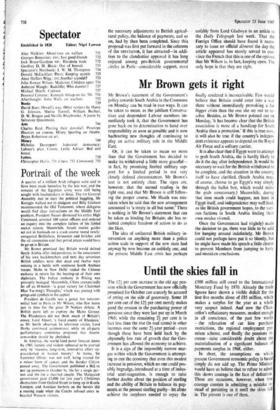Until the skies fall in
The 121 per cent increase in the old age pen- sion which the Government has now officially promised for October can scarcely be accused of erring on the side of generosity. Some 10 per cent out of the 124 per cent merely makes good' the erosion in the purchasing power of pensions since they were last put up in March 1965; while the remaining 24 per cent is in fact less than the rise (in real terms) in other incomes over the same 2k-year period—even though these have been held back by the abysmally low rate of growth that the Gov- ernment has allowed the economy to achieve.
It is a sign of the impossibly narrow mar- gin within which the Government is attempt- ing to run the economy that even this modest increase in pensions, which no one could' pos- sibly begrudge, introduced at a time of indus- trial semi-stagnation, is enough to raise further doubts about the position of sterling and the ability of Britain to balance its pay- ments at the present sterling parity—let alone achieve the surpluses needed to repay the £5130 million stilt owed to the International Monetary Fund by 1970. Already the trade figures have shown a visible deficit for the first five months alone of £85 million, which makes a surplus for the year as a whole very suspect indeed. And now the Chan- cellar's reflationary measures, modest enough in all conscience, of the past few weeks —the relaxation of car hire purchase restrictions, the regional employment pre- mium scheme, and finally the pensions in- crease—raise considerable doubt about the materialisation of a significant balance of payments surplus in 1968, either.
In short, the assumptions on which present Government economic policy is based simply do not add up. The Prime Minister would have us believe that to refuse to admit this shows courage in the face of defeatism. There are occasions, however, when true courage consists in admitting a mistake in- stead of persisting in it until the skies fall in. The present is one of them.






























 Previous page
Previous page